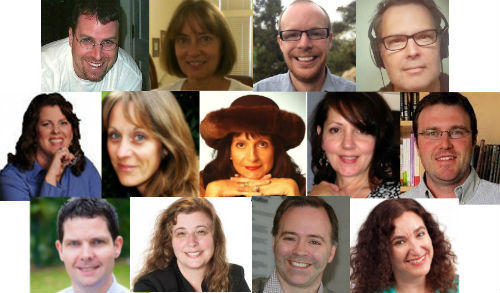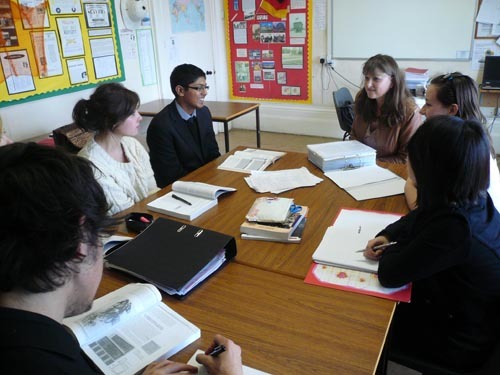
According to a report from the Alliance for Excellent Education, teacher attrition costs the United States up to $2.2 billion annually. Roughly half a million U.S. teachers either move or leave the profession each year, and tragically, this serious problem disproportionately affects high-poverty schools.
It’s essential that we keep every teacher we get. Yet classroom teaching is arguably the most stressful job there is. Somewhere between 40 e 50 percent of those that go into teaching are gone within five years. Teachers matter, and if we are to have excellent teachers, we not only have to focus on recruiting qualified candidates but also creating an environment in which they can flourish.
In pursuit of solutions to the problem, A Pesquisa Global para a Educação asked our Top Global Teacher Bloggers this month: What are the top ten ways that administrators can help new teachers avoid burning out?
Adam Steiner (steineredtech) discusses in his blog the kind of pressure that teachers feel because of the political pressure put on schools to perform. Improving schools is called the “accountability” approach where teachers are held directly responsible for the numerical scores of their students on a single annual test. Adam says, “The relentless drive toward higher test scores has left teachers feeling a palpable pressure to show student progress above all else – and the price that is paid is in student social emotional health and a passion for lifelong learning. Evidence of this over-emphasis on data is in student stress surveys that show that students are overwhelmed with expectations and workload. If students are burned out, their teachers won’t be far behind.” Leia mais.
Pauline Hawkins (PaulineDHawkins) points out that the key to retaining teachers is in the social relations between both the administration and other teachers. New teachers should be paired up with master teachers in a mentor/mentee relationship. New teachers require a whole network of support so that they feel like part of a team. New teachers should be allowed to “concentrate more on building relationships with students rather than on producing flawless curriculum.” Principals should do more than just dole out orders, they should be made to listen to and build rapport with every new teacher. Leia mais.
Expectations should be lined up with experience. Vicki Davis (coolcatteacher) diz, “new teachers are given hard jobs that no one wants. When you give a new teacher too much or too difficult of a task, you’re setting them up for failure.” She points to not only curriculum overload but to the central problem that every first year teacher faces: disciplina. Keeping students on track and focused with their work is unlike any job in the world. Leia mais.
Balance is something that new teachers have a hard time finding. Sometimes it can feel like school is their whole world and that can be terribly overwhelming. Craig Kemp (mrkempnz) suggests that teachers must be allowed to have time for self-care. They should still be able to play sports, listen to music, or go running. Craig points to staff drinks and social gatherings as being essential to a healthy education culture. Teachers should be encouraged to associate outside the classroom. Leia mais.
Education has a distinct culture that is different from the rest of the work world. Todd Finley (finleyt) suggests that because of this, “every school has norms of which new faculty might be unaware. Therefore strong mentoring colleagues are critical. A good first meeting would involve discussing a fact sheet of 20 things that might not be obvious to rookies.” Transparency is key for keeping new teachers. A checklist should be made for less visible procedures so that there are no surprises for new teachers. Expectations should be made upfront and totally clear if new teachers are expected to meet them. Leia mais.
Richard Wells (@EduWells) indicates that first year teachers should not be made to bite off more than they can chew. Ele diz: “Don’t add to the burden by giving new teachers a wide scope of courses or topics to get to grips with. Keep the initial focus on a narrower curriculum demand. Let them build confidence in a small amount before taking on the full job.” He also points out the double benefit of team-teaching: it relieves some of the pressure put on new teachers as well as provides a time-efficient source of professional development. Leia mais.
A Pesquisa Global para a Educação would like to thank our Top Global Teacher Bloggers for sharing their insightful perspectives.
Tom Bennett (@ Tombennett71), Joe Bower (joe_bower), Susan Bowles (FloridaKteacher), Lisa Currie (RippleKindness), Vicki Davis (coolcatteacher), Todd Finley (finleyt), Pauline Hawkins (PaulineDHawkins), Craig Kemp (mrkempnz), Karen Lirenman (KLirenman), Adam Steiner (steineredtech), Silvia Tolisano (langwitches) e Richard Wells (@EduWells) estamos A Pesquisa Global para a Educação 2014 Topo 12 Professor global Bloggers. In Memoriam Joe Bower (joe_bower).

Lead photo courtesy of Shutterstock.com
Junte-se a mim e líderes de renome mundial, incluindo Sir Michael Barber (Reino Unido), Dr. Michael Bloco (EUA), Dr. Leon Botstein (EUA), Professor Clay Christensen (EUA), Dr. Linda, Darling-Hammond (EUA), Dr. MadhavChavan (Índia), Professor Michael Fullan (Canadá), Professor Howard Gardner (EUA), Professor Andy Hargreaves (EUA), Professor Yvonne Hellman (Holanda), Professor Kristin Helstad (Noruega), Jean Hendrickson (EUA), Professor Rose Hipkins (Nova Zelândia), Professor Cornelia Hoogland (Canadá), Honrosa Jeff Johnson (Canadá), Senhora. Chantal Kaufmann (Bélgica), Dr. EijaKauppinen (Finlândia), Secretário TapioKosunen Estado (Finlândia), Professor Dominique Lafontaine (Bélgica), Professor Hugh Lauder (Reino Unido), Senhor Ken Macdonald (Reino Unido), Professor Geoff Mestres (Austrália), Professor Barry McGaw (Austrália), Shiv Nadar (Índia), Professor R. Natarajan (Índia), Dr. PAK NG (Cingapura), Dr. Denise Papa (US), Sridhar Rajagopalan (Índia), Dr. Diane Ravitch (EUA), Richard Wilson Riley (EUA), Sir Ken Robinson (Reino Unido), Professor Pasi Sahlberg (Finlândia), Professor Manabu Sato (Japão), Andreas Schleicher (PISA, OCDE), Dr. Anthony Seldon (Reino Unido), Dr. David Shaffer (EUA), Dr. Kirsten Immersive Are (Noruega), Chanceler Stephen Spahn (EUA), Yves Theze (LyceeFrancais EUA), Professor Charles Ungerleider (Canadá), Professor Tony Wagner (EUA), Sir David Watson (Reino Unido), Professor Dylan Wiliam (Reino Unido), Dr. Mark Wormald (Reino Unido), Professor Theo Wubbels (Holanda), Professor Michael Young (Reino Unido), e Professor Minxuan Zhang (China) como eles exploram as grandes questões da educação imagem que todas as nações enfrentam hoje.
A Pesquisa Global para Educação Comunitária Página
C. M. Rubin é o autor de duas séries on-line lido pelo qual ela recebeu uma 2011 Upton Sinclair prêmio, “A Pesquisa Global para a Educação” e “Como vamos Leia?” Ela também é autora de três livros mais vendidos, Incluindo The Real Alice no País das Maravilhas, é o editor de CMRubinWorld, e é um Disruptor Fundação Fellow.
Siga C. M. Rubin no Twitter: www.twitter.com/@cmrubinworld






Comentários Recentes